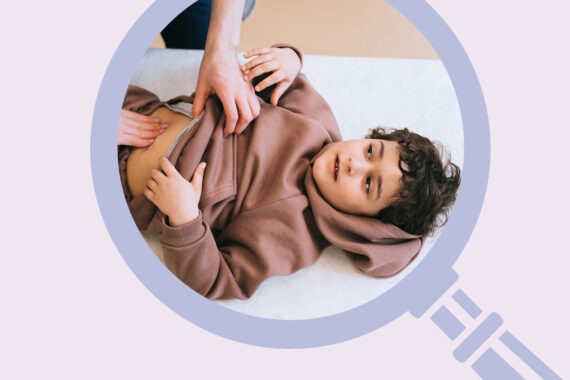Case of the month – answers: Did you get the diagnosis in this child who ‘can’t shake off a bug’?

In the latest in our series, Dr David Capehorn asked what might be the underlying cause in a child who is withdrawn and lethargic several weeks after apparent gastroenteritis. Did you get the diagnosis? Answer revealed below!
Note details of the case have been changed to protect individuals’ identities
A pale-looking five-year-old is brought into a busy morning clinic by his mother. ‘He’s just not himself,’ she says. ‘He’s been a bit off for a couple of weeks – eating less, seems more tired than usual.
‘He’s had a couple of bugs. Nothing major though – just loose stools, mild tummy pain and a low fever. But no vomiting.’
On examination, his abdomen is soft and non-tender. No red flags jump out.
Judging that recent viral gastroenteritis seems likely, and that it could be post-viral fatigue, the GP offers reassurance and advises fluids and rest.
Two weeks later, the child is back at the GP clinic. He’s still not himself. His mother says he now naps during the day – something he hasn’t done since he was three. He’s eating poorly and hasn’t bounced back. The loose stools continue, but aren’t frequent or severe.
Again, the GP is not overly concerned, so offers reassurance and safety-netting advice: ‘It’s probably just lingering viral effects, but come back if he worsens or in 2 weeks if still no better.’
At a third visit 2 weeks later, a different GP sees the child.
This GP enquires: ‘Are the loose stools happening at night too?’
The mother pauses, then says: ‘Yes, sometimes he wakes us up needing the toilet. I thought that was just part of the bug.’
That detail changes the picture. The GP checks his growth and notes there’s been no weight gain for 12 months. In fact, the boy has dropped a centile on the growth chart.
His abdomen is still soft. No guarding or organomegaly. But now, the pattern feels wrong.
Investigations are arranged, with blood tests showing:
- CRP: raised
- ESR: raised
- Coeliac screen: negative
What further investigation might you like to do? What’s the likely diagnosis?
Answer: The GP arranges a stool sample for faecal calprotectin testing – the result is 800mcg/g, pointing to paediatric inflammatory bowel disease (Crohn’s disease).
They boy is referred to paediatric gastroenterology. Endoscopy confirms mild Crohn’s disease. He’s started on treatment – and begins to thrive.
Learning points
Nocturnal diarrhoea: Stools that wake a child at night are always a red flag. The gut is typically less active during sleep – persistent night-time symptoms should prompt concern for organic pathology.
Growth faltering: A missed opportunity – weight was not recorded until the third visit. Yet the child hadn’t gained in a year. Weight loss or centile drop, especially alongside GI symptoms, should always raise suspicion.
Fatigue and withdrawal: Early signs of many chronic illnesses. Especially in younger children, who can’t easily articulate their discomfort.
‘Just another virus’: A recurring theme. If a child keeps picking up ‘bugs’ but never fully recovers, consider whether the root cause might be something more systemic.
A fresh pair of eyes: It was the GP at the third visit who paused, asked a slightly different question, weighed the child – and changed the clinical direction entirely.
Clinical pearl
Paediatric IBD often presents subtly. Children may not complain of pain or frequent diarrhoea. Instead, look for clues in growth patterns, night-time symptoms, behavioural changes and parental instinct. Faecal calprotectin is a useful, non-invasive early test when IBD is suspected.
Further reading
- Oliveira S et al. Diagnosis and management of inflammatory bowel disease in children. BMJ 2017;357:j2083
For more diagnostic puzzles, see previous articles in our Case of the month series:
- Case of the month answers: What was causing this patient’s nausea and tingling fingers? – Pulse Today
- Case of the month answers – what was causing this patient’s panic episodes? – Pulse Today
- Case of the month – answers: Did you get the cause of the patient’s sudden memory loss? – Pulse Today
- Case of the month answers: Did you get what caused this man’s pityriasis rosea? – Pulse Today
- Case of the month answers – what was the cause of this young worker’s abdominal pain? – Pulse Today
Have you handled a case which had a slightly surprising outcome? Perhaps an elderly man with non-vertigo dizziness? Or an unexpected cause of bradycardia? Would you like to share your case studies with us to help support and inform GPs? Please get in touch if you would like to contribute! [email protected]
Portfolio careers
What is the right portfolio career for you?

Visit Pulse Reference for details on 140 symptoms, including easily searchable symptoms and categories, offering you a free platform to check symptoms and receive potential diagnoses during consultations.
Related Articles
READERS' COMMENTS [1]
Please note, only GPs are permitted to add comments to articles













This will be difficult to implement. I am sure the commonest cause of diarrhoea at night is viral gastroenteritis or simple food intolerance (sweets and parties is a common cause too).